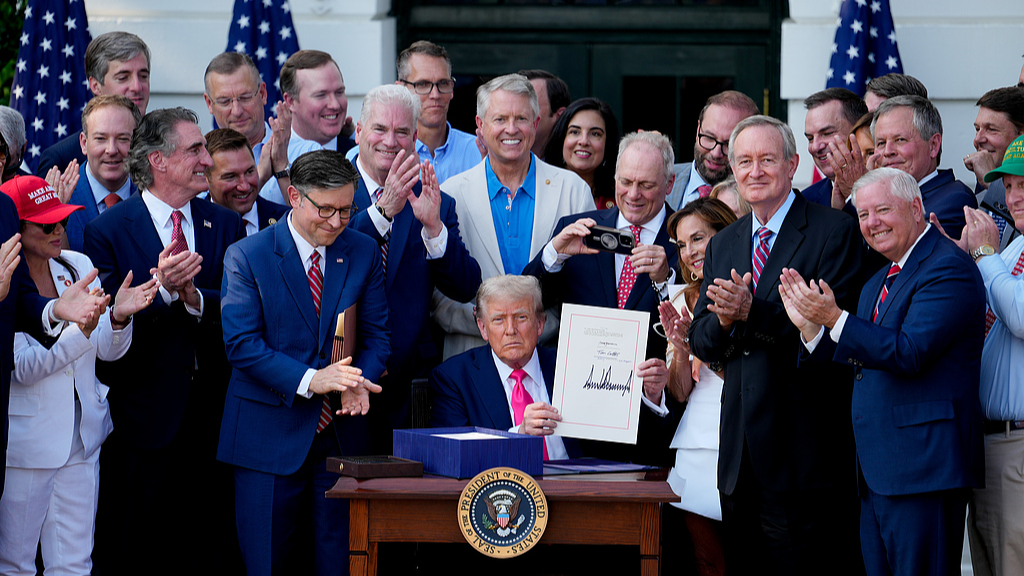🇺🇸 Introduction: A Historic Independence Day Move
On July 4, 2025, President Trump ceremoniously signed the One Big Beautiful Bill Act (OBBBA) on the South Lawn of the White House, complete with B‑2 bomber flyovers and VIP guests. Framed as a crowning achievement of his second term, this sweeping fiscal package brings a mix of permanent tax cuts, defense build‑ups, and sharp reductions to domestic safety programs—and has major implications for both the economy and everyday Americans.
For Manika TaxWise readers, it’s crucial to dive in and unpack what this bill means for taxes, public services, and strategic financial planning.
🚦What Is the “One Big Beautiful Bill”?
Key components of OBBBA include:
-
Tax Cuts Galore
-
Permanency for Trump-era individual tax rates from 2017
-
Cap on State and Local Tax (SALT) deduction raised to $40,000 (phasing back after 5 years)
-
New deductions: up to $25k on tips/overtime, $10k/year on U.S.-assembled auto loan interest
-
Enhanced child tax credit (+$200 to $2,200) and new “Trump Accounts” for kids—all set to expire in 2028
-
-
Spending Cuts & Program Overhauls
-
Medicaid and SNAP (food stamps): reduced funding, work‑based eligibility, increased state burden
-
CBO estimates ~11 million may lose Medicaid, 3 million lose SNAP by 2034
-
-
Spending Increases: Border, Defense & Debt
-
$350B for immigration enforcement, including ICE and deportation operations
-
$150B additional defense funding, including $25B on missile defense
Raises debt ceiling by $5T
-
📊 Financial and Economic Impact: Table at a Glance
| Category | Estimated Change | Key Impacts |
|---|---|---|
| Tax Cuts | −$4.5T revenue over 10 yrs | Benefits high earners, middle-income (SALT cap) |
| Program Cuts | Medicaid −$1T, SNAP down | Millions lose coverage, increased state burden |
| Spending Increases | +$300B+ border & defense | Boost defense industry, immigration enforcement |
| Deficit / Debt | +$2.8–3.3T by 2034 | Higher national debt, risk future interest rise |
💡 Practical Tips for Your Finances
-
Check Your Deductions
-
Individuals earning < $150k may benefit from new deductions (tips, OT, auto interest).
-
Hubbard ensure SALT deduction timing—plan pre vs. post 5-year rollback.
-
-
Update Tax Prep Strategy
-
Estate and gift tax exemptions are indexed to inflation—consider early annual gifting.
-
Maximize child tax credit before sunset.
-
-
Plan for Healthcare & Safety Net Gaps
-
Low-income families: Medicaid cutbacks may mean seeking ACA marketplace plans.
-
SNAP recipients: new work requirements may affect benefits—stay informed.
-
📉 Who Wins and Loses?
-
Winners:
-
Higher-income households (permanent tax cuts, SALT increase).
-
Tipped/overtime workers below limits.
-
Defense contractors and immigration-related industries.
-
-
Losers:
-
Low-income and Medicaid-dependent individuals.
-
Clean‑energy sectors facing phased-out credits.
-
Long-term public debt stress affecting all taxpayers.
-
🧾 Real-Life Examples
-
James & Priya (Combined income ₹60L): SALT deduction bumped from ₹7.5L to ₹3M cap under OBBBA, saving ~₹2.25L extra deduction annually.
-
Food‑stamped households in TX: Work requirements could lose benefits; projected ~300k Texans overall.
-
Defense Valley Inc.: With an added $150B to defense, it's expanding production—boosting hiring and contractor stock.
🤝 Conclusion: A Mixed Financial Bag
Trump’s One Big Beautiful Bill delivers on bold promises—unprecedented tax reliefs, stronger border security, and tax-exempt benefits for workers. Yet it comes with significant trade-offs: deep cuts to health and welfare programs, mounting national debt, and fading credits for clean energy.
For Manika TaxWise readers: this opens opportunities for tailored financial strategies, but also signals caution—especially for vulnerable families and future fiscal stability. Stay proactive, keep tracking legislative guidance, and be prepared for continued changes ahead.
🔍 FAQs
Q1: Who benefits most from OBBBA?
Middle-to-high earners: bigger SALT cap, permanent tax rates, tip/overtime deductions.
Q2: Will healthcare costs rise?
Yes—nearly 11M could lose Medicaid; others may turn to private/ACA plans.
Q3: How long do new provisions last?
Tax deductions (tips, accounts) expire around 2028; SALT cap reverts in 5 years.
Q4: Does it impact climate change incentives?
Yes—many clean-energy tax credits trimmed or removed.
Q5: Should I update my tax filing?
Absolutely—review new rules, especially if claiming SALT/Senior/Tip deductions.


